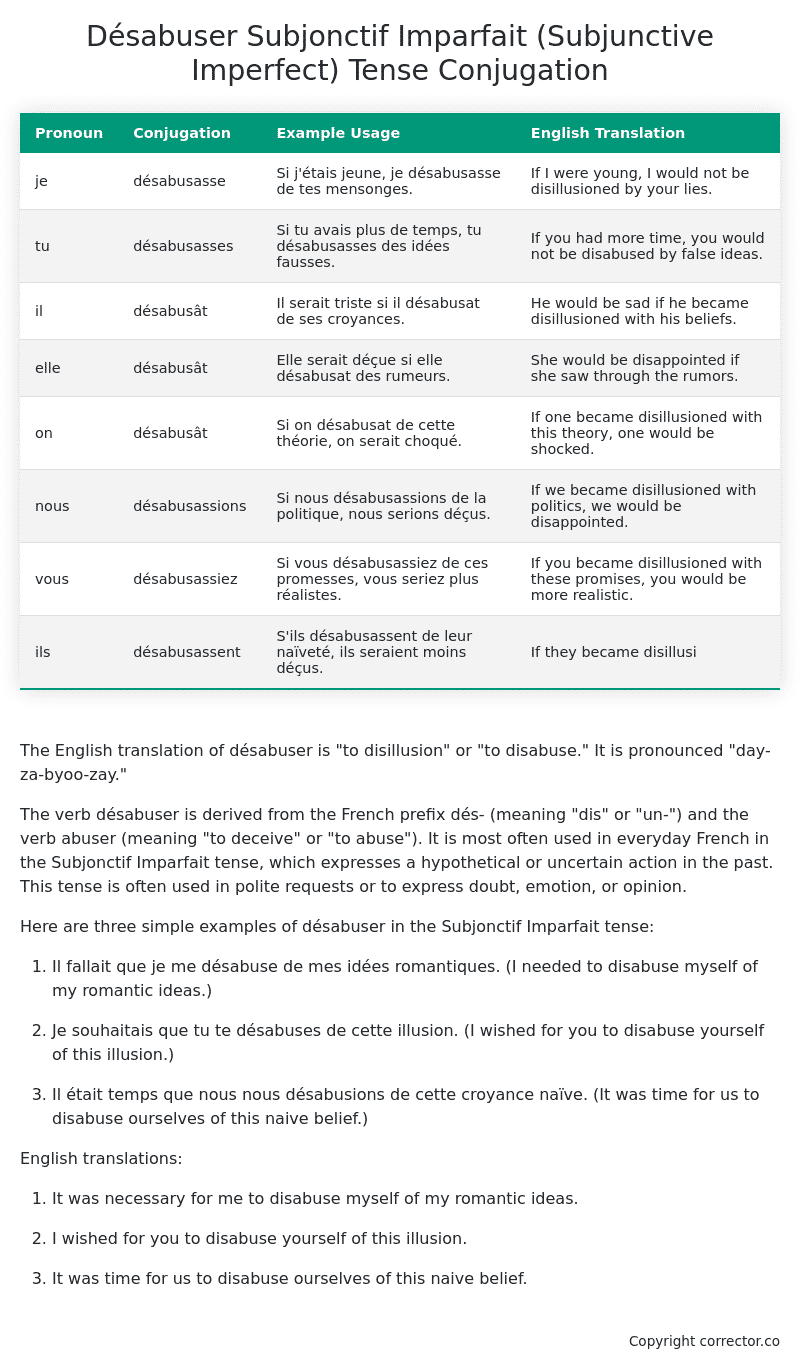Subjonctif Imparfait (Subjunctive Imperfect) Tense Conjugation of the French Verb désabuser
Introduction to the verb désabuser
The English translation of désabuser is “to disillusion” or “to disabuse.” It is pronounced “day-za-byoo-zay.”
The verb désabuser is derived from the French prefix dés- (meaning “dis” or “un-“) and the verb abuser (meaning “to deceive” or “to abuse”). It is most often used in everyday French in the Subjonctif Imparfait tense, which expresses a hypothetical or uncertain action in the past. This tense is often used in polite requests or to express doubt, emotion, or opinion.
Here are three simple examples of désabuser in the Subjonctif Imparfait tense:
-
Il fallait que je me désabuse de mes idées romantiques. (I needed to disabuse myself of my romantic ideas.)
-
Je souhaitais que tu te désabuses de cette illusion. (I wished for you to disabuse yourself of this illusion.)
-
Il était temps que nous nous désabusions de cette croyance naïve. (It was time for us to disabuse ourselves of this naive belief.)
English translations:
-
It was necessary for me to disabuse myself of my romantic ideas.
-
I wished for you to disabuse yourself of this illusion.
-
It was time for us to disabuse ourselves of this naive belief.
Table of the Subjonctif Imparfait (Subjunctive Imperfect) Tense Conjugation of désabuser
| Pronoun | Conjugation | Example Usage | English Translation |
|---|---|---|---|
| je | désabusasse | Si j’étais jeune, je désabusasse de tes mensonges. | If I were young, I would not be disillusioned by your lies. |
| tu | désabusasses | Si tu avais plus de temps, tu désabusasses des idées fausses. | If you had more time, you would not be disabused by false ideas. |
| il | désabusât | Il serait triste si il désabusat de ses croyances. | He would be sad if he became disillusioned with his beliefs. |
| elle | désabusât | Elle serait déçue si elle désabusat des rumeurs. | She would be disappointed if she saw through the rumors. |
| on | désabusât | Si on désabusat de cette théorie, on serait choqué. | If one became disillusioned with this theory, one would be shocked. |
| nous | désabusassions | Si nous désabusassions de la politique, nous serions déçus. | If we became disillusioned with politics, we would be disappointed. |
| vous | désabusassiez | Si vous désabusassiez de ces promesses, vous seriez plus réalistes. | If you became disillusioned with these promises, you would be more realistic. |
| ils | désabusassent | S’ils désabusassent de leur naïveté, ils seraient moins déçus. | If they became disillusi |
Other Conjugations for Désabuser.
Le Present (Present Tense) Conjugation of the French Verb désabuser
Imparfait (Imperfect) Tense Conjugation of the French Verb désabuser
Passé Simple (Simple Past) Tense Conjugation of the French Verb désabuser
Passé Composé (Present Perfect) Tense Conjugation of the French Verb désabuser
Futur Simple (Simple Future) Tense Conjugation of the French Verb désabuser
Futur Proche (Near Future) Tense Conjugation of the French Verb désabuser
Plus-que-parfait (Pluperfect) Tense Conjugation of the French Verb désabuser
Passé Antérieur (Past Anterior) Tense Conjugation of the French Verb désabuser
Futur Antérieur (Future Anterior) Tense Conjugation of the French Verb désabuser
Subjonctif Présent (Subjunctive Present) Tense Conjugation of the French Verb désabuser
Subjonctif Passé (Subjunctive Past) Tense Conjugation of the French Verb désabuser
Subjonctif Imparfait (Subjunctive Imperfect) Tense Conjugation of the French Verb désabuser (this article)
Subjonctif Plus-que-parfait (Subjunctive Pluperfect) Tense Conjugation of the French Verb désabuser
Conditionnel Présent (Conditional Present) Tense Conjugation of the French Verb désabuser
Conditionnel Passé (Conditional Past) Tense Conjugation of the French Verb désabuser
L’impératif Présent (Imperative Present) Tense Conjugation of the French Verb désabuser
L’infinitif Présent (Infinitive Present) Tense Conjugation of the French Verb désabuser
Struggling with French verbs or the language in general? Why not use our free French Grammar Checker – no registration required!
Get a FREE Download Study Sheet of this Conjugation 🔥
Simply right click the image below, click “save image” and get your free reference for the désabuser Subjonctif Imparfait tense conjugation!

Désabuser – About the French Subjonctif Imparfait (Subjunctive Imperfect) Tense
Formation
Common Everyday Usage Patterns
Interactions with Other Tenses
Subjonctif Présent
Indicatif Passé Composé
Conditional
Conditional Perfect
Summary
I hope you enjoyed this article on the verb désabuser. Still in a learning mood? Check out another TOTALLY random French verb conjugation!


